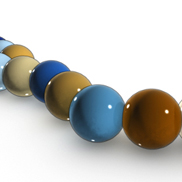
peptide
A peptide is a short chain of amino acids. The amino acids in a peptide are connected to one another in a sequence by bonds called peptide bonds. Typically, peptides are distinguished from proteins by their shorter length, although the cut-off number of amino acids for defining a peptide and protein can be arbitrary. Peptides are generally considered to be short chains of two or more amino acids. Meanwhile, proteins are long molecules made up of multiple peptide subunits, and are also known as polypeptides. Proteins can be digested by enzymes (other proteins) into short peptide fragments. Among cells, peptides can perform biological functions. For example, some peptides act as hormones, which are molecules that when released from cells affect other areas of the body.
Further Exploration
Concept Links for further exploration

















